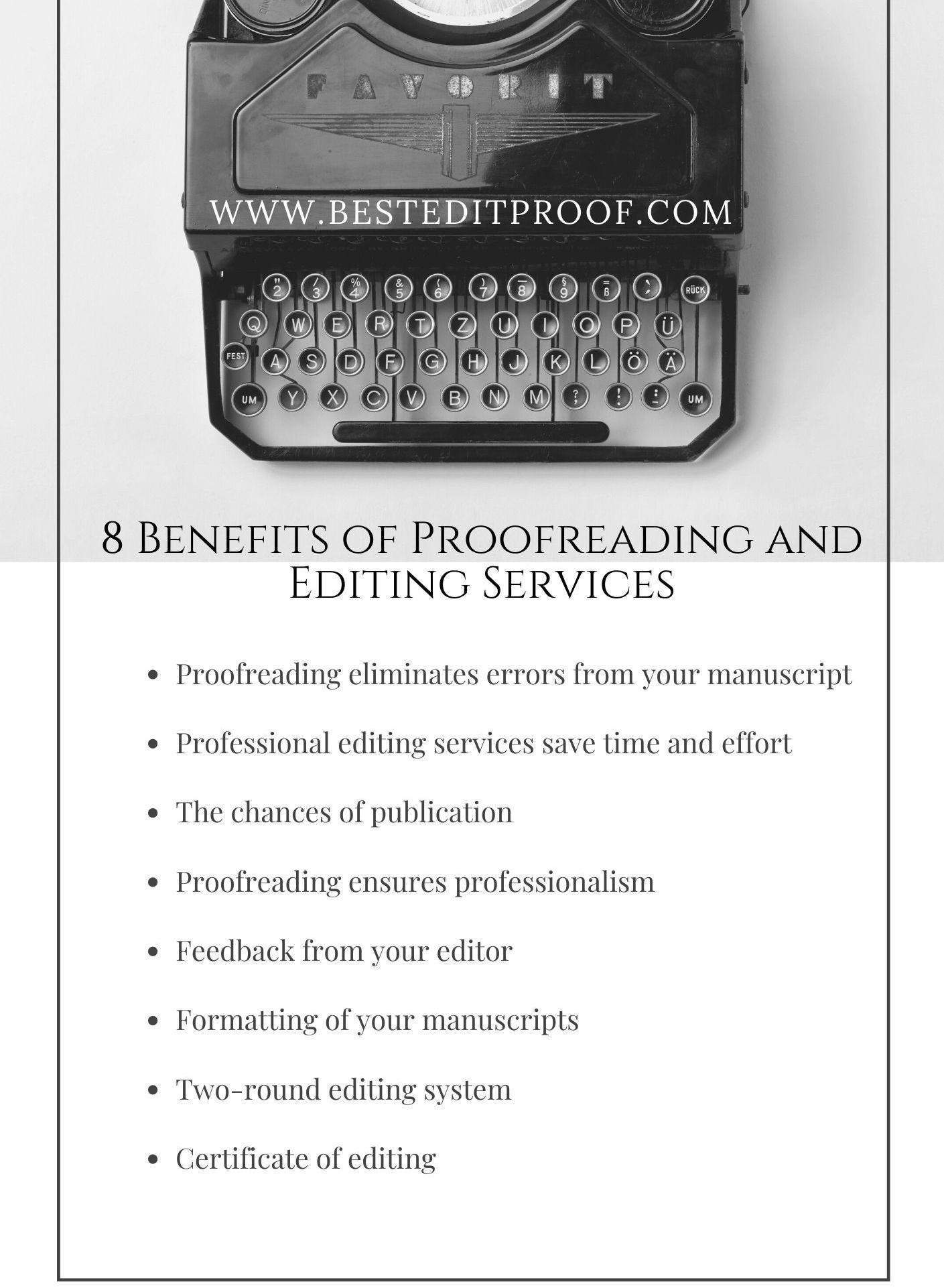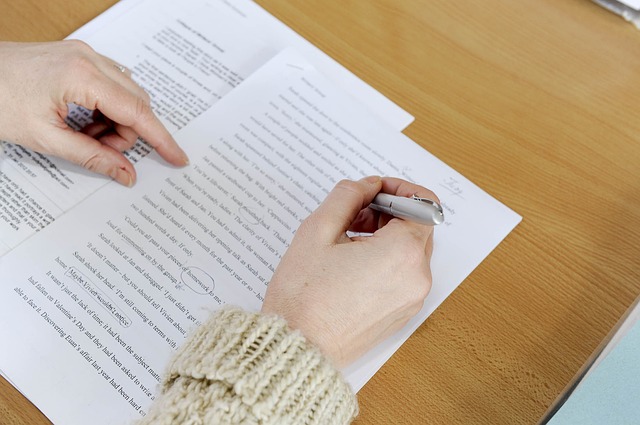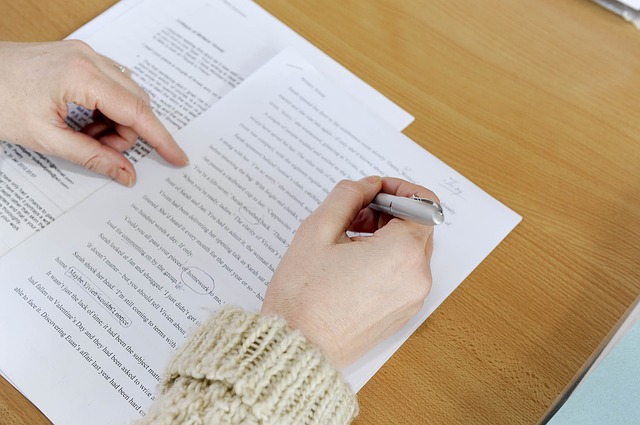There is always a possibility that your paper may have some errors and that you may have missed some important issues as you were intensely involved in the writing process. In finalizing your writing, it is always helpful to have it edited professionally. Hence, this phase typically demands a fresh pair of eyes to identify and correct any error you may have missed. You might be surprised at the errors an editor would detect that you may have missed. That is why English language experts always recommend that authors should not rely merely on their own improvements and corrections.


As we always discuss, there is always a possibility that your paper may have some errors and that you may have missed some important issues as you were intensely involved in the writing process. In finalizing your writing, it is always helpful to have it edited professionally. Hence, this phase typically demands a fresh pair of eyes to identify and correct any error you may have missed. You might be surprised at the errors an editor would detect that you may have missed. That is why English language experts always recommend that authors should not rely merely on their own improvements and corrections.
The main purpose of a proofreading service is to correct all errors in grammar, typography, punctuation, syntax, and spelling in a manuscript. However, an editing service aims at improving the overall quality of writing by enhancing the flow, readability, and structure. This is the main difference between editing and proofreading services.
Look at the following analogy to comprehend properly the difference between these two services: An architect, in our case, the editor, takes an old building and refurbishes it by removing existing walls and replacing them with new materials, adding new chambers, removing floors, and setting up new parterres. Hence, it is safe to say that it is a practically a newly created building with the same foundation. Then, the housing inspector, the proofreader in our context, comes along to ensure that everything is properly in place, especially details for safety precautions, etc. The main role of the inspector is not to create anything. Thus, the proofreader’s purpose is not creative.
Hence, an editor who provides editing services also corrects all errors in grammar, typography, punctuation, syntax, and spelling in your manuscript. In this sense, editing services also comprise proofreading services. However, strictly speaking, proofreading is the last stage before it is delivered to the client. Thus, even if the editor has corrected many of the errors that a proofreader would correct, the paper must still pass through this last stage.

When you want to make sure that the final version of your document is error free, you need proofreading services. Proofreading requires an advanced expertise comprising extensive knowledge of the English languageand is essentially the final phase in the process of preparing a manuscript.
Editing services require greater effort from an editor than does proofreading services from a proofreader because the former primarily aim to improve the academic quality of your manuscript. Hence, editing services usually involve improvements of the content, overall structure, quality of findings and analysis, simplicity, referencing, and format of the manuscript.
For academic achievement, staying ahead of the pack is always a crucial issue. Taking advantage of professional academic editing and proofreading can help you reach your potential and increase chances of your work being published in professional journals. It requires a broad-ranging comprehension to fix a document exceptionally. Therefore, academic editing and proofreading are a critical part of the writing process.
An edited document in which errors in spelling, grammar, punctuation, and typos are corrected.
As well as ensuring clarity, coherence, and an authoritative tone, having your work proofread and edited by a professional editor saves a lot of time and effort. A professional editor who is a native speaker of English edits your work quickly and professionally and saves you time, improves your own writing, and helps you to meet required standards for a grammatically perfect sophisticated manuscript.
The chances of publication of the manuscript are manifold enhanced. For academic achievement, staying ahead of the pack is always an important issue. Taking advantage of professional English editing and proofreading services can help you to reach your potential and increase the chances of your work becoming published in a professional journal. Manuscripts edited by experienced native-speaker editors have an edge in the peer-review process.
Outside of the academic world, proofreading or editing your document is essential for ensuring a professional presentation. This applies to everything from business reports and cover letters to CVs and resumés, and so proofreading and editing will be crucial throughout your professional career.
Upon request, professional editing and proofreading companies provide a certificate of editing, which is generally required by many journals. It certifies that the manuscript has been edited and proofread by professional editors and proofreaders and that these processes were executed to ensure that the manuscript is free of (but not limited to) such English language errors as those of clarity, coherence, diction, grammar, punctuation, spelling, style, and syntax.

With editing and proofreading services, you will have several valuable feedback from your editor and proofreader. They entail changes and suggestions to help improve the clarity, flow, structure, readability, and quality of the manuscript. The revised version of your manuscript is returned with all edits visibly marked. In fact, all edits, including corrections, suggestions, and comments via the Microsoft Word Track-Changes function, appear in the margins of your returned document. It’s easy to see and follow all the suggestions and changes as well as to accept or reject them. You will also see some important comments that the assigned editor has left on the right-hand side of the page (Click here to see how to use the MS Word Track-Changes function).
A professional editor formats your references and citations according to your target journal’s guidelines. Your editor follows the required citation styles, such as the American Psychological Association (APA), Modern Language Association (MLA), or Chicago/Turabian style.
Best Edit & Proof has a two-round editing system, and each paper is edited by two doctorally qualified editors and language experts to make the manuscript flawless and more brilliant.
All type of manuscripts, including essays, articles, and theses
College assignments and reports
Undergraduate and graduate essays
Theses and dissertations
Journal articles
Research projects
Literature reviews
Systematic reviews
Case studies
Presentation scripts
Brochures, booklets, and posters
Stories, book manuscripts
Texts for PowerPoint slides
Business documents
Conference proceedings, posters, and presentations
Professional letters
Personal statements
Job applications
Cover letters
CV and resumés
Admission documents
Research statements
Statements of teaching philosophy
Best Edit & Proof expert editors aim to provide your manuscripts with proper scholarly and academic tone and style. They will significantly improve the chances of having your research manuscript accepted for publishing. They provide subject-area proofreading and editing services in several fields categorized under various disciplines. With our extensive knowledge and expertise, we will help you find the right tone and style for your manuscript.
If you need our subject-area editors to format your manuscripts, giving you the fundamental rules for formatting your manuscripts as described in your guidelines, such as APA, MLA, or Chicago/Turabian styles, then contact us. At Best Edit & Proof, our proofreaders and editors edit every type of academic paper. We have a user-friendly website and a simplified ordering process.
If you would like our subject-area editors and language experts to work on your project for the improvement of its academic tone and style, then please visit the order page. It is easy! It takes only a few minutes to submit your paper and complete the process. Click here to see how it works.
We have flat-rate pricing based on our type of service (editing or proofreading), word count, and turnaround time. Enter your word count or copy and paste your document into our pricing calculator to get an instant quote.
If you need support for editing and proofreading services, contact us. You can also e-mail us or use the 24/7 live chat module to get direct support. We have a 24/7 active live chat mode to offer you direct support along with qualified editors to refine and furbish your manuscript. Alternatively, you can text us through our WhatsApp business line.
Follow us on Twitter, LinkedIn, Facebook, Instagram, and Medium.
For more posts, click here.
This article discusses the eight benefits of using professional proofreading and editing services. To give you an opportunity to practice your proofreading, we have left a few spelling, punctuation, or grammatical errors in the text. See if you can spot them! If you spot the errors correctly, you will be entitled to a 10% discount.

The difference between proofreading and editing is a challenging issue to understand. This article provides a general overview of these two services and discusses what they involve. Knowing the difference is especially important when you intend to hire an editor to polish up your manuscript. Writing academic or research papers require specific knowledge of editing and proofreading. Obviously, you would always like to write error-free and easy-to-read content. Thus, you should concentrate on eliminating grammar mistakes, punctuation errors, sentence construction issues, and many more.
Continue Reading
The digital influence has touched every element on the face of the earth. The business industry, among others, was influenced the most by these changes and advancements. The same applies to the literary and academic world. Various online tools have made it possible for every aspect of the academic world to be better, quicker, and more precise. This article discussed five useful editing and proofreading tools and their important features.
Continue Reading
Although editing and proofreading terms can be used interchangeably, they are two different stages of the revision process. Before you avail of these services, there are certain things that you should consider. Knowing these things allows you to hire skilled editors and proofreaders. It also protects you from overpaying. To help you out, we have listed some important points below.
Continue Reading
To err is human, and the same applies to the field of editing and proofreading. No matter how much of an expert you are or how much experience you have, you are bound to make mistakes. Especially for a field like this, where you need to be meticulous, it is natural for you to miss out on words or make some typing errors. This article is more targeted toward people who are new to editing and proofreading and want to avoid making mistakes.
Continue Reading
Although most editing and proofreading are performed today using the ‘Track Changes’ feature of Microsoft Word or other commenting tools, you may encounter traditional proofreading marks and symbols on a hardcopy document. In desktop publishing, it is important to understand the meaning of proofreaders’ marks. Both editors/proofreaders and clients, regardless of their backgrounds, should have the same standard marks for easy communication.
Continue Reading
Proofreading is one of the basic procedures carried out on a text to render it flawless. This procedure requires extensive knowledge and comprehension to correct a manuscript excellently. Proofreading is of importance when you need your document to be checked for errors in grammar, punctuation, syntax, spelling, and formatting.
Continue Reading
Depending on the skills and budget, you can do your proofreading. Yet, getting professional help will give you better products and advice. This will improve your piece of writing for the best. In this guide, we will breeze you through brief info on what proofreading services are.
Continue Reading